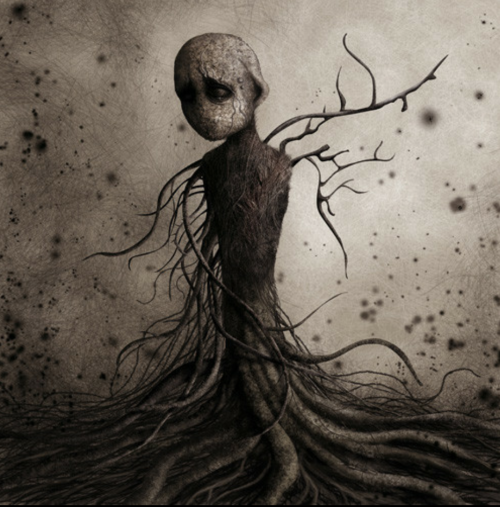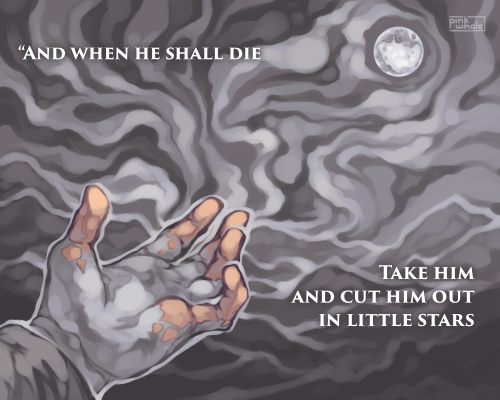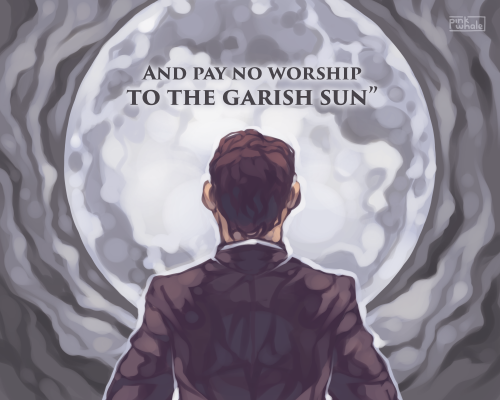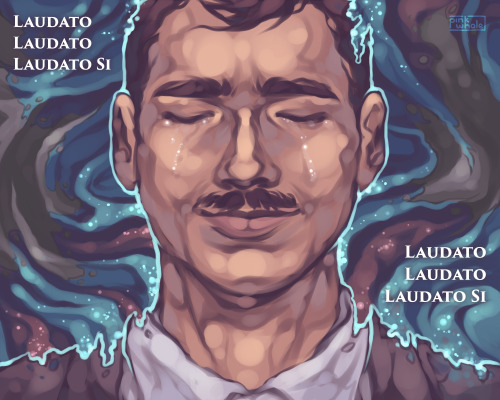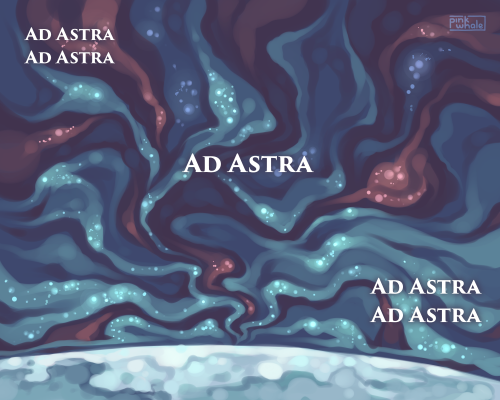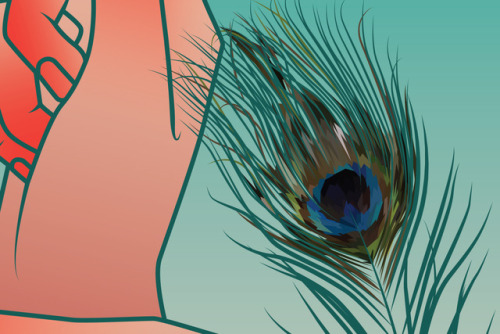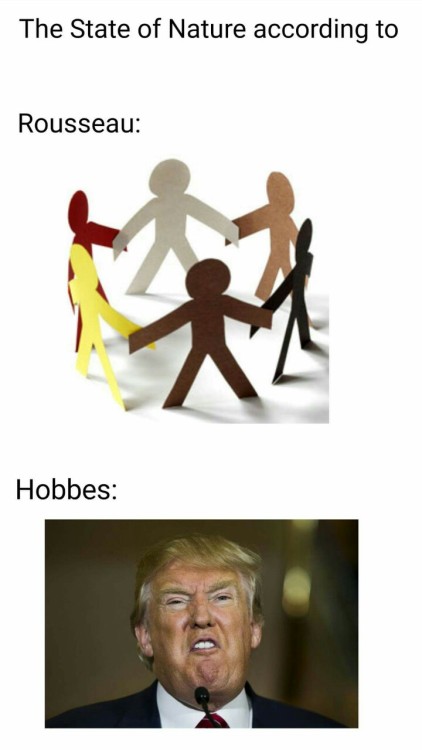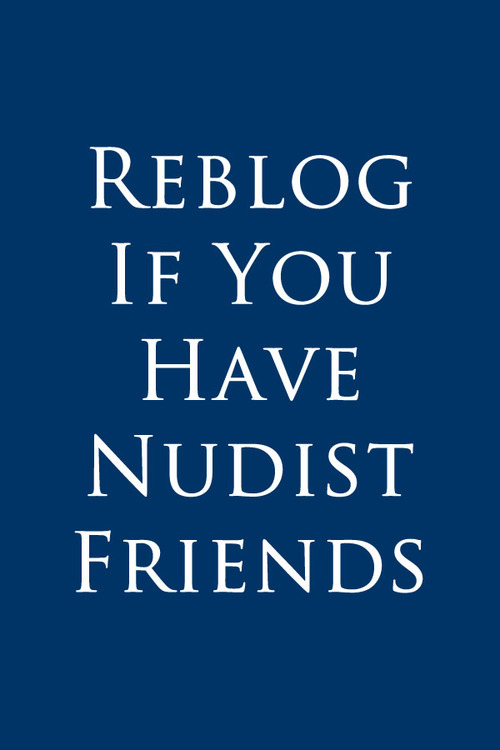#human nature
The biggest crime of the later books is how Anne Rice completely threw away what would’ve been far more profound for Louis (and of course, Claudia was dead) because of her rampant author’s pet blind spot. Ironically, Louis was her self-insert, while Lestat was her husband and Claudia was her dead daughter.
It’s like it never occurred to her that the “Human Nature” trope (see Clark in Superman II, Angel in Angel: the Series, Clark again in Smallville, the Tenth Doctor in Doctor Who, Castiel in Supernatural, etc…) is so much more profound for the tragic inhuman character who actually desires most to be human, is at odds with their own species or wants to experience human belonging/family/love, rather than the one who would happily throw away that humanity they never really wanted (Lestat in The Tale of the Body Thief). Funnily enough, Brad Pitt’s Meet Joe Black is also this trope. Louis, not Lestat, is the character who belonged with this trope as it is in every other piece of fiction that uses it. Those medias understood it’s best used as a heartbreaking gut punch instead of a comedy romp. It’s something that hurts when it is cruelly snatched away or must be given up for the sake of a duty larger than oneself. The only Vampire Chronicles character who would prefer even more to be human than Louis because of the profound unhappiness in their physical form would be Claudia. It’s the thing they most have in common together.
Merrick was yet another time when these characters’ potential to continue on the center stage was woefully misused and under-realized in favor of endless new OCs and Lestat. Louis was written out of the starring role that put Anne Rice’s career on the map the second she and the fandom wrote him off as a liar, despite never being able to fully retcon out Lestat’s actions during Interview with the Vampire. There were certainly better uses for Claudia’s ghost than as a cruel manipulation that then never gets closure for her or Louis’ obviously continuing feelings for her. Given that he’s still not over her death more than a century later, it’s always the elephant in the room in regards to Louis in the present. It’s the storyline that keeps Louis frozen in time, unable to continue his own story beyond the 19th century except as a series of vignettes and observations by other characters. Merrick completely failed both Louis and Claudia. He’s as much of a ghost in the present story as she is.
Because of this, Louis’ story now will always be incomplete; a profoundly influential character used as little more than a prop in the background of other characters’ narration. And of course, Claudia’s tragedy was being incomplete from the start.
Characters like Angel and many copycats (not only vampire characters either–Russell T Davies has fully admitted Buffy and Angel’s influence on his Doctor Who revival and Torchwood spinoff, while the entire Fanged Four are Anne Rice’s archetypal lineup) would directly not exist without Louis. And yet, Angel got the center stage as the deeply-flawed inhuman protagonist with a “human soul” that Louis never got again. Louis is Anne Rice’s archetype (a massive influence on all inhuman creatures with human feelings ostracized from their own kinds, doomed to never belong to either world and the outsider looking in on a life they can never have) that has actually inspired more leads than Lestat ever did. Other media, in Interview with the Vampire’s image, knew that the flashier, funnier, cooler Lestat archetype (which was likewise influential, but rarely an initial lead) is instead an antagonistic, often villainous foil to a more serious, introspective character’s existential crisis and the greater philosophical and moral depth that this brings a story.
Anne Rice stumbled upon that when she wrote Interview with the Vampire, but seemingly didn’t understand it. Or perhaps it was easier for her to avoid her personal trauma by focusing instead on an object of fantasy and fancy.
Unfortunately, she denigrated Louis to make Lestat palatable as an antihero instead of a villain or even antivillain. He and his POV became inconvenient to the change in narrative and Lestat’s POV became rarely challenged, despite him being the more likely of the two to fit as the unreliable narrator with far more reasons to lie and make himself look better. His verifiable actions contradict lies like him only killing evildoers. Claudia being the most glaring refutation, but also the fact that Louis was targeted not because he was evil, but rather because he had wealth Lestat wanted. Louis was telling his story as a cautionary tale in which he wasn’t sugarcoating himself (quite the opposite–he’s the king of self-loathing) or anyone else, not a narcissistic ego trip disguised as a rebuttal.
The author’s retcon and fandom buying into the narrative of Louis as the unreliable narrator is a huge mistake and it goes a long way to explain the fall in quality of the later series. Louis should never have been consigned to the role of Antonio Salieri.
I really like this photo. The reason is because it depicts how human civilization came to be. Think about it, America, England, Rome, Persia, the Aztecs etc all because strong because they enslaved people, made them suffer and caused pain and built their life off others suffering. This shows somewhat how human nature is..
Post link
The root of all evil…
The root of all evil is not money but ultimately humans… money plays is part in evil bit it’s us humans that use it in order for our own greed..
Post link
“Earth provides enough to satisfy every man’s needs, but not every man’s greed” - Mahatma Gandhi
Such a true saying, we humans can never be satisfied by what we have or by getting what we need. This is one of the biggest reasons we have war, pain, suffering and the world going into great turmoil…
Post link
Humanity as it Could be
(pieces from 2020 which i hold really close to my heart)
on july 31, 1999 eugene shoemaker, an american geologist, became the first and only person whose ashes were carried to the moon. he had a dream to fly there once, yet it came true only two years after his death.
nightwish released a song about him in 2020, and it touched me deeply. inspired by its ending, i wanted to portray the moment when shoemaker finally found peace.
Post link
| People and Puzzles |
People are like puzzles.
People are not puzzles because they are tough to figure out— no; rather, it is the transformation from shattered fragments to fractured masterpiece that is so similar to the human condition. When a man is born, he is a box of broken and confused pieces dumped out onto the table of existence. He is unsorted, helpless— a mess.
The hands of life and experience slowly bring about a half-done image, a partially completed project that only brings frustration and discouragement to those who glance at it. It’s when the puzzle is nearer to completion that the true worth of its existence is seen.
The beauty of a puzzle does not lie in the perfection of the finished image; rather, the beauty lies in the spiderweb of fractures— the lines, curves, cracks and angles— that show proof of a broken masterpiece brought together.
People are like puzzles. Their true worth is seen in how their broken pieces come together to create the stunning masterpiece that is Healed Humanity.
.
~Reigh Lynne
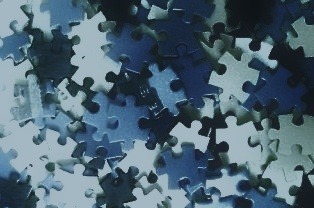
This artwork depicts a bird gesture which symbolizes human desire to look good for others. The peacock feather is a symbol of vanity in many cultures around the world. One of hands is decorated with a conteprorary jewellery to emphasis a fact that selfie is a present days social phenomenon. The fire in the root of a conmposition shows the agony of making a realy good selfie.
Post link
Thinking about that guy that posted on reddit about how his dad got POA over his grandmother with dementia and “invested” (gambled) her life savings in cryptocurrency
I had a taxi driver who told me that he took a lot of money out of a savings account he shared with his wife to invest in some coin (without her knowledge), got rugpulled, and went into so much debt that he had to sell their house. Fuming, his wife took the kids to Pakistan to live with her parents, where she cought COVID and died.
I’ve heard a handful of stories of guys “investing” money they couldn’t afford to lose in cryptocurrency, because they believed it was guaranteed to go up, and about what happened to them when they realized it was not.
I’ve heard enough of these stories that I’m not sure where to place these guys. Are they all victims that have been lied to? Are they perpetrators of greed and blatant stupidity? Is the Kind Of Guy that buys into a stupid bubble actually a very important ecological niche in our economy, some kind of host to already fabulously wealthy wealth-extractors?
I guess the question I’m really trying to answer for myself is: “am I supposed to feel bad for these people or not?” And will a policy of compassion merely subsidize wealth extraction from lower classes, as this kind of shit happens once a decade?
I mean. yes. their lives are fucked because they fell for a scam. seems pretty straightforward to feel sorry for them, even if a) they made bad choices and b) they hurt other people doing that
Will compassion towards them subsidise further scams? Very dependent on implementation details. There are obvious problems with saying “oh no you got scammed, here, we’ll just make you whole out of the government’s pocket” (note that this is distinct from “we caught scammers and recovered the money, here’s yours”)
what can you do? financial literacy helps, but you can’t subsidise that enough that nobody ever bets their life savings on some bullshit (or indeed some non-bullshit that happened to get unlucky! “legitimate” investments can lose money too). there’s already complicated rules about who can invest on what things and what kinds of disclosure you need before some random person can invest in you, and scams still happen
and the further along you go on that scale, the more you’re curtailing people’s freedoms. which is in fact bad. if some people keep making bad decisions with money at some point all you can do is take away their power to spend their own money and give it to someone else (a relative, the government), but that is obviously ripe for abuse.
I don’t really have an answer. but i think it’s important to maintain a sense of compassion that these people really are victims and it’d be better if they were not scammed, because otherwise it’s very easy to fall into a trap of “well, if you’re stupid enough to fall for a scam, you deserve to” and sweep the problem under the rug.
Are they victims? They seem more like people who stole a lot of money from their loved ones and then lost it in an idiotic way, all with extremely gendered undertones.
I think these are just shitty men, and even with much more financial literacy in our society there would still be stupid assholes who do shit like this.
shitty men can be victims. if you lose all your money to a scam then yes you are the victim of the scam, that is what the word means.
if you also stole that money from someone else then that makes you an asshole too, obviously.
A rug pull is one thing, but I don’t want to say general investing in a speculative bubble is the same as a scam. Also, about rug pulls, If I buy something that emphasizes it’s lack of regulation & “code as law” as a selling point, what expectations am I allowed to have for that very same regulation when the code does something I don’t like?
does it actually matter if the terrible financial decisions that ruined your life were specifically a scam or just a shitty investment? life is ruined either way.
re: regulation and code as law. there’s a lot of schradenfreude when someone touts deregulation as a bonus and then appeals to the regulatory system to fix a problem, sure. it’s a great illustration of why financial regulation exists. even so, people’s life being ruined is bad. People’s life being ruined by their own terrible decisions is bad. The decisions being terrible, and even foreseeably, obviously terrible, still doesn’t make their lives being ruined a good thing, and it’d be a better world if we could prevent that, and we don’t have a lot of tools to do that that don’t go through a regulatory system or other government involvement of some sort. which have their own downsides, of course.
I find your argument compelling because a compassionate society is important to me, but I think the speculative bubble thing *does* matter. It’s a speculative bubble, you buy it because you think you can swindle someone else into paying more for it because they think they can swindle someone else into paying more for it, so like, when one finds out otherwise, they’re suddenly a victim?
Honestly, I look at these guys like victims of MLM scams and the stories are often pretty similar; most of the people who got in this deep weren’t terribly tech savvy and certainly don’t understand finance in any meaningful way, but that’s also true of people who take out tens of thousands of credit card debt because they’re “investing in their stock and will make it back if they nurture their downline” with herbalife or whatever.
I think it’s important to approach things like crypto/nfts/and MLMs as something analogous to social engineering. Really, I even kind of think this is true of some Return of Kings blackpilled incel stuff - it is taking advantage of the way the human brain works in order to sell something and make a profit and the people at the top basically never really believe what they’re selling but they know it’s important to sell the narrative to keep the income flowing.
That, and I think it’s important to acknowledge that there are addictive elements here; gambling addiction is a real phenomenon and I’m sure it seems more legitimate to squander your grandmother’s savings on an ‘investment’ than on a slot machine, but these are functionally the same thing. Critics of crypto speculation have pointed out that it’s gambling for a long time now, but they are shouted down. The “Self-created high control group” chapter of the Folding Ideas NFT video goes into some depth on the way these guys end up in insular communities that try to shout down any rational criticism - and yes, they are somewhat at fault for getting there in the first place, but once you’re surrounded by a bunch of people who have strong norms to keep holding failing assets and to never discuss the possibility of a loss it’s a lot harder to get a reality check.
Like, there are absolutely moms who threw their kids college accounts down the drain trying to realize a profit selling leggings; there are mary kay reps who have lost their houses to pay back unsold, expired inventory they bought to chase a pink cadillac. At some point they should have stopped, and they really hurt people when they didn’t, but they didn’t stop because they were being manipulated and lied to by people who have built very successful fraud empires.
It’s terrible that these people have hurt the people around them, have devastated their families and taken away their security and safety (and fuck, that taxi driver’s story is rough), but they are also the victims of a campaign specifically targeting vulnerable people who aren’t financially literate enough to know that what they’re doing is gambling and who are surrounded by people who say “everyone who says it’s gambling is just mad that they aren’t going to be rich like you.”
It’s very bad and predatory and I hate it and I can’t particularly feel sorry for people who have ruined other people’s lives through their ignorance but I also can recognize that the fact that they were able to participate in these schemes in the first place is indicative of a failure outside of themselves. Like, this is very clearly something that should have been regulated well before it started eating people’s lives and people often get sucked into scams because they think that if it was a scam it would be illegal, so an offer to invest must therefore be legitimate.
OH ALSO
A lot of these people DON’T think they’re fucking the person in their downline.
They don’t really understand that the money isn’t infinite, or that the market will get saturated with too many people selling wax melts, or that there’s got to be a bigger fool.
It’s like the Nesara Gesara thing; people think that there’s this one weird trick that can actually make everyone wealthy and they don’t understand why their friends and family are resisting this thing that is obviously good for society.
There is a baseline ignorance of economics involved that is really fundamental and impossible to ignore; the “We’re all going to make it” crew doesn’t realize that it is impossible for *everyone* to get rich the way that they plan to.
Yeah…
Also, when you are married you are usually considered a single economic entity under law. So they aren’t technically stealing from their spouse. And this is exactly the kind of arguement that originally led to Prohibition laws against alcohol. The husband would get paid, spend it all on booze, and then the wife and kiddies would have no food. There are a bunch of silent film shorts around this subject from the 1920’s-1930’s.
This is variably true in different places but it IS important to note that any names on a shared bank account all have the exact same rights and access and that the only way to limit that access is to close the bank account.
I’m saying this because it’s important that you are extremely careful who you agree to share a bank account with. My literary magazine closed its doors when one of the editors went out of the country and began using the magazine account - that had like 500 and was supposed to pay for the next printing, so not a LOT but more than we could afford to lose - to pay for his travel expenses out of our account and started overdrafting it, which cost the rest of the editors on the account money until me and the copy editor were able to meet up and go to the bank together on a Saturday to shut it down, by which point he’d already added up three hundred dollars in overdraft fees that we had to pay to close the thing.
And I’m also saying this because if you have a solo account that your spouse is NOT on then they do NOT have legal access to that account. There’s some flexibility to that (so if the money in the account is considered a 'shared asset’ you can maybe still be sued for it so that someone filing for bankruptcy can’t just hide money in their spouse’s account to get out from under debts) but your spouse cannot legally access a personal checking or savings account that is yours unless their name is on it or you are dead.
I actually think that it’s really, really, really important to normalize keeping separate bank accounts even after you get married. It’s worthwhile to have one joint account for household expenses, but you and your spouse should have your own money that you aren’t accountable to each other for.
One of the ways that people end up being financially abused is by a partner saying “I want our whole lives to be together; don’t you trust me? We should do everything together” and then ending up in a situation where their partner can not only take all the money in an account but can also observe any spending on the account or observe changes (like different pay deposits if you start trying to stash money in another account.) I think we need to make it normal to say “I *do* trust you but I am an adult and I want a place for money that is *my* money, not *our* money so that I can use it for things for myself, not for us.”
If your partner feels betrayed or threatened by the idea that you want to keep some of your own money separate from a joint account (as long as everyone’s living expenses in the household are met) then you maybe shouldn’t be with that partner.
There was an article going around a little while ago that was basically like “my husband and I fight about me spending more of my paycheck vs him saving more of his, so we set ourselves allowances!” and the whole time I was reading I was like “why the fuck do you not have personal bank accounts that pay a set amount for bills into a joint account???”
Like the assumption that you should fully merge your finances went unquestioned, even though it was the main cause of the problem!
This wasn’t “we can’t pay the bills” level and it wasn’t “we’re saving up for something and the contributions are super inequitable” level, it was literally just that one of them spent a bit more than the other on a weekly basis. Your partner shouldn’t even be able to see that to start fights over it!
Also, regarding the people who lost money in Crypto, and in MLMs…
We live in a society where even people who are ‘middle class’ and own a house, etc. are generally only one disaster away from poverty (especially in the US where health care is so expensive).
When you’re living in that kind of precarious situation, and you’ve been working all your life, and you seem to have done everything ‘right’ but you know you’re still struggling, or could easily be pushed into struggling if someone gets sick or your car breaks down, it’s pretty fertile ground for scammers and schemes like this.
You have that little bit of extra income (or savings) so what if you just used that to make your life better! You’ve seen all the Silicon Valley people who are lauded as amazing entrpreneurs and what everyone should aspire to be jumping on the bandwagon and making a lot of money!
You’ve seen the people at the top of the MLM getting incredibly rich!
So why shouldn’t you? Maybe it’s what you need when normal business and financial systems don’t seem to be working for you.
And that’s what a lot of these things rely on! NFTs are only valuable because people were expecting to be able to sell them for a profit. Which is great if you’re a rich tech bro getting in on the ground floor! There’s tonnes of people wanting to buy them! But as the hubub dies down… you get normal people who aren’t that rich who thought they were buying something for their future.
It’s like with a lot of apartments and houses bought as investments - they’re bought so they can be sold on. While they’re being held as empty buildings (or as Air BnBs) they don’t have an occupier paying tax or rates (I’m in the UK so I don’t know the equivalent anywhere) so there’s less money being spent on the local area, so it gets more run down. It basically becomes property pass-the-parcel but the person holding the parcel at the end just gets a scrunched up ball of paper.
And we live in a society that currently is really primed for this sort of scam. Lots of desperate people and lots of rich people willing to fleece people to get richer.
I read Human Nature for the first time, and it was wild! Completely different from the tv version, even tonally. The main similarity is the setting and the romance, but even John Smith is a different character. The tv version feels better edited and more concise, but the book is a lot of fun, and you can’t help but love Benny (she’s designed that way)! Now I want to read a ton of Virgin New Adventures…
“He knew from experience that the living never found out half of what was really happening, because they were too busy being the living. The onlooker sees most of the game, he told himself. It was the living who ignored the strange and wonderful, because life was too full of the boring and mundane.”
- Terry Pratchett - Reaper Man
‘put a woman together, the dream-man said.
I took the pin
and rolled her skin thinner.
put the woman together, the dream-man said.
I weighed the brain and heart as one
but left the lungs and liver.
put the woman together, the dream-man said,
and I chose eyes for her;
now put her together, he repeated, voice irritated, now—
but I had no clue how to stitch her.’
'the woman together,’ - Megan’s Poetry #1261
if peter cushing’s version of the doctor was purely human, does that mean that, if left unchecked, he’d eventually become obsessed with gallifrey in the same way that the gallifreyan doctor is obsessed with earth?
iknowhe’darrive on gallifrey, take one look at rassilon, and loudly announce, “yeah, i could fix him”




It Started With A Kiss
Impression, Sunrise by Claude Monet, 1873.

Impression,Sunrise was painted by Claude Monet in 1873. It depicts the sunrise in French harbor of Le Havre in 1873.This painting is said to have started the impressionism movement. It might look less subtle with its short brush strokes but it never intended to be in the first place. Here Monet captured an atmospheric condition by painting vivid , adjacent and contrasting colours. It emphasizes the light itself and subjects are given less importance. The flickering light from sun in the early morning pierces through fog and reflected on the water. We see two silhoutted figures on the boat. The painting tries to capture the light from sun as it travels. The blotch of orange in the sky gives us more of a feel for nature. The seascape and horizon meets with no actual separation depicting the serenity of this moment in time. As my eyes wandered from left to right, i sense nothing but the vastness of time and shortness of human life. Maybe i am seeing things that are not there, maybe the illuminated atmosphere is what is missing from my life. I don’t know, i am a human being whose sense of perception can be deceived through the use of few brush strokes. But whatever that is , i tend to be grounded in reality and maybe Monet actually tries to send this message across instead of working on the details and subtlety of his paintngs. So in my opinion(which doesn’t matter as no one else’s opinion matter),this painting eerily produces a realist portrayal of nature and its relationship with humans. A moment or experience, far away from the cacophony of what lies ahead.
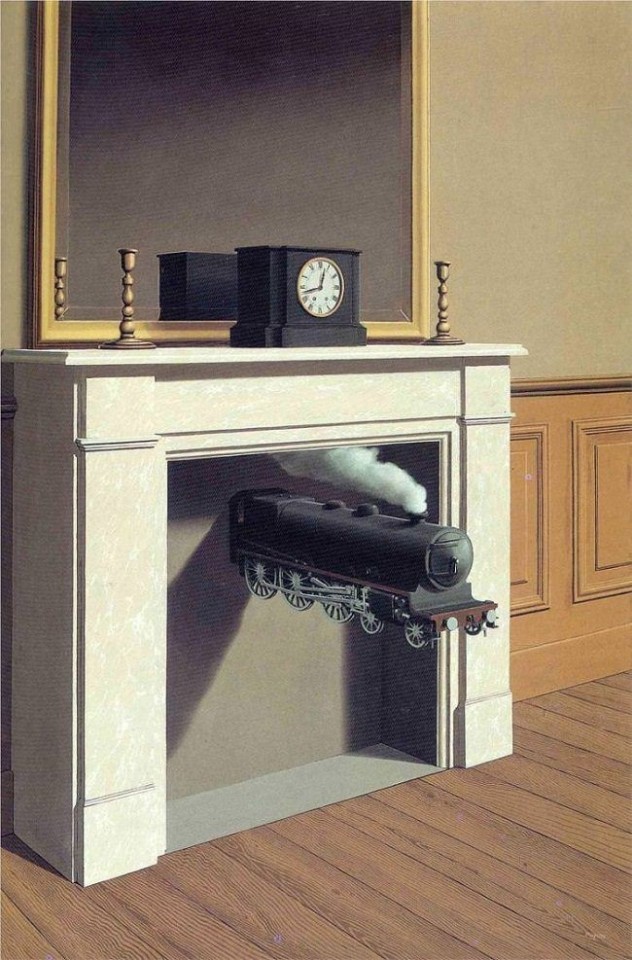
Time Transfixed by Reńe Magritte, 1938.
This painting took a hidden feeling of mine and brought it to light. Reńe Magritte’s Time transfixed talks to you like your imaginary friend(lets be honest guys) who knows you inside out and tells you harsh truths without ever judging you. Looking at the painting, our attention goes straight to the locomotive charging out of fireplace. It disturbs the mundanity of the scene and took us by surprise. The painting also emphasizes the clock placed over the fireplace in front of a mirror and in between two candles. Through the combonation of these odd objects, Magritte captures our vacillated and lost selves. The one which yearns to be a part of the crowd, to get emotional fulfilment socially. But at a certain point, wants to be left alone with his/her gloomy thoughts. The picture seems like a real motion event in which the locomotive may charge through the fireplace at any moment and disturbs the placidity of the room. But at the time It is stopped. It enters our consciousness and urges us to think about our banal but hidden feeling. It tries to redeem those moments when you are unwelcome and do not want any intrusion of any kind even after having many friends. It also depicts our desire to capture and eternalise delightful moments with someone before they become memories. This is the level of contradiction this picture tries to capture. The reflection of left candlestick is visible, but it’s not the same for right one. This represents our two contrasting feelings. We carry this dilemma our whole lives and in the way we get misunderstood by people. Its quite interesting how Magritte uses locomotive and clock to bring these feelings to the surface, but only through these candles we see their faces. The mirror does not reflect the rest of the room and tries to focus our attention to these candles. Every object carries a sense of purpose, it only depends on the viewer to extract these purposes. This painting assures us about the normality of our feelings and tells us its not our fault.

-Charles Bukowski
HOMILY for the Christmas Mass during the Night
Isa 9:1-7; Ps 95; Titus 2:11-14; Luke 2:1-14

Many of us, I’m sure, are grateful that we live in these technological times in which virtual reality is possible. Thanks to video cameras, and a stable internet bandwidth, we can be physically distanced and yet virtually, spiritually present. Some of you might be watching this Mass on our livestream on YouTube for example, and many of us will have worked from home, participated in Zoom meetings, and attended classes and talks online. And I am grateful for the respite and opportunity these have afforded us. I, for one, am glad I was able to witness via WhatsApp my only niece’s first birthday party, held in North Carolina back in February. Last month, via Zoom, I also preached at my last surviving grandfather’s funeral held in Kuala Lumpur. And like so many of you who may have had to do this kind of thing, I acknowledge that this was better than nothing at all; virtual presence is better than absence.
But all our Zoom meetings and hours online staring at screens can leave us brain-dead, feeling like ‘Zoombies’. And although a virtual birthday party is better than nothing, it just reminds us of how empty or unsatisfying a virtual presence can be, like a hug emoji when you’re down, or a photo of flowers or sunsets on your anniversary, when what you want is to smell, feel, touch, see, and experience the real physical embodied material thing.
So, one thing we can all realise after almost two years of all the above and more, is that we’re not disembodied souls - ghosts. Neither are we dis-ensouled bodies - zombies. We’re not pure spirit like the angels are, nor are we just bodies of flesh, blood, nerves and sinew without transcendent intelligence as mere beasts are. Rather, to be human is to a marvellously unique and complex unit of body and soul: we’re spiritual and capable of great ideas and thoughts and of enjoying beauty and music and books. But at the same time, we hunger and thirst, and feel pain and sickness, pleasure and delight. For such is our human nature, to be both physical and spiritual creatures such that the physical uplifts the spirit, and the spiritual delights the body such as when we appreciate good food with friends and family, or listen to our favourite song, or receive a hug from a beloved granddaughter.
Christmas, therefore, focusses us on the reality and marvel of being human, with all its ups and downs. For at the centre of Christmas is the mystery of the Incarnation, the marvellous (and for some, scandalous and incredible) claim that God became Man, born in Bethlehem in Judaea, born of Mary and swaddled in a manger. The Gospel we’ve just heard attends to all the human elements of this claim, for if we’re talking about the birth of a human being, we immediately place him within a family, a society, and a history, and a cultural context – St Luke fills us in on all these human details. It is these circumstances and the concrete facts of culture, relationships, and material objects like swaddling clothes and a manger, that serve to make the Incarnation real and not just virtual reality.
So, of course, from the start people have made note of these real locations, and been on pilgrimage to these places, and preserved as relics the material objects connected to the birth of Jesus. For this is what human beings do, and one of the things I love about being Catholic is the very human bodily manner in which we relate to Jesus. For, quite rightly, we’re not content with just hearing about the birth of Jesus, nor do we want to just see it through a screen, but rather we want to journey there too. Hence every church has a Nativity scene where we can go, and see and touch and experience the wonder of the coming of God as Man – born as one of us, a human being like us, and thus located in human history and a human place. Indeed, he is to be located now, tonight, in this church, here.
All those years ago the prophet had foretold that there will be “a child born for us”, and then the shepherds were told by angelic messengers: “a Saviour has been born to you”, born foryou. And rightly do we rejoice that Christ has been born to save mankind fallen into sin. And yet, in our excitement over the end result we might miss the marvel of the process: A child has been born forus. And who is this us? Mankind, you and I with our human nature. So God has been born for us human beings, taking on a human nature himself in the person of Jesus Christ. Thus the Offertory carol tonight says: “Then was I born of a virgin pure,/ Of her I took fleshly substance/ Thus was I knit to man’s nature/ To call my true love to my dance.”
This last bit tells us, again, what it means to say that a child has been born forus because the reason that God became Man, the reason that God took on a human nature like ours, was so that he might communicate with us through the bodily and physical ways that we understand well, and the reason he does this is to call us to his dance. And here is the core reason for Christmas and for tonight’s celebration.
Now, arguably, only those who have bodies and who live in time and space can dance. Therefore, when this carol speaks of God’s dance, it is referring to the Incarnation of God, and for us human beings to be called to God’s dance means that we are being called graciously to move in co-ordination with God, to learn to sway in sync with Christ and to follow his lead along the ways of goodness and of love. Anyone who has been watching Strictly Come Dancing knows what happens when the partners in the dance are not attuned to each other! So, to speak of us taking up God’s dance is to speak of our Christian moral lives, and so Christ comes to teach us how to be human.
For the human person is a unity of body and soul such that with his whole being he can freely choose to love. Therefore, Christ comes to show us, by his words and by his teaching and by his actions and example, how to love. In Christ, God comes as our true love to show us how to truly love. As human beings we love not in disembodied ways, not only with our minds, nor only abstractly in our imaginations, nor only through virtual reality – we’ve been forced to do this kind of thing over the past year and a half and we know it doesn’t really satisfy. Neither do we love by only satisfying our bodily desires and pleasures, for to only pay attention to the bodily or only to the spiritual would be incomplete, inhuman, and therefore sinful. Rather, we must love as human beings, which means we love with our whole beings, body and soul, with all the joys and fears and sorrows and pains and music and art and food and amazement and wonder that comes with our full human experience. Therefore Jesus said: “Love the Lord your God with all your heart, and with all your soul, and with all your mind, and with all your strength” and “love your neighbour as yourself.”
Therefore, when God becomes Man, he is born into a family, a society, a culture because it is likewise in our families, our communities, our parishes, our homes that we shall exercise love and learn to love well as Jesus does. Christ worked and toiled; he knew the oppression of governments, and the humiliations and injustices done by others; and he knew the sorrow of missing a friend, a father who has died. But he also laughed, and joked, and enjoyed delicious feasts and the smell of perfumed nard, and the company of friends and the comfort of his dear mother. Through all these genuinely human contexts, Christ exercised love, and so it is for us too. Through our ordinary and daily human circumstances, the joys and sorrows of being human, we have been called to become like Christ, to be moved by his grace so that we are attuned to the rhythm of the divine dance, doing ordinary things with true love so that we shall become like God who is Love, Incarnate. So St Athanasius sums up the core message of Christmas, the great central mystery of the Incarnation: “God became Man so that Man might become God”.
The mistake many make is to think that this should happen abstractly, merely spiritually, or mentally. The mistake is to think that religion is disembodied or that it denigrates the human body, or suppresses the world’s authentic pleasures and freedoms, or that it is only about what I believe but not what I do. Nothing could be further from the truth when it comes to Christianity. For ours is a bodily incarnational faith so, as Tertullian says, “the flesh is the hinge of salvation.” If so, then the great marvel of the Incarnation is that our God becomes Man in each one of us, he desires to be really present in each of us, whom he calls his “true love”. So, in each of us, in our bodies and in our lives, Christ comes to be born again and to take flesh in each of us through his gift of grace. So St John of the Cross said that “each of us is the midwife of God”. And God knows that a virtual presence is not sufficient for us, so he comes to us in a spiritual-material way, really present for us here and now in the Holy Mass; he comes tonight in the Eucharist to dwell in us. So, let us offer the Christ Child the hospitality of our hearts and of our homes.
For as the Servant of God Dorothy Day reflected: “I am so glad that Jesus was born in a stable. Because my soul is so much like a stable. It is so poor and in unsatisfactory condition because of guilt, falsehoods, inadequacies and sin. Yet, I believe if Jesus can be born in a stable, maybe he can also be born in me.” Indeed, so let us rejoice. For today a Saviour has been born to us, for us, in us: he is Christ the Lord!


